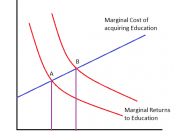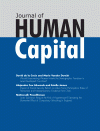Turnover
Turnover is defined as any departure beyond organisational boundaries. Turnover may be voluntary on the part of the employee (resignation) or involuntary (death, requested resignation)
Not all turnover is bad, and expecting to eliminate turnover completely is unrealistic and impossible due to natural turnover from retirement
Advantages
÷ Young workers bring new skills and ideas into the firm
÷ Especially useful in industries undergoing rapid technological change
÷ In stagnant firms, new workers can bring about change to the company's culture, norms and belief, thereby stimulating growth
÷ New workers have often learned the latest techniques and methods, so they will require less initial training and retraining
Disadvantages
÷ Older workers have well-honed job skills
÷ May have a better handle on the information that is of most benefit to the firm
÷ So, will have an advantage in firm-specific human capital and in the general human capital that is best learned on the job
The following factors influence the optimal ratio of younger to older workers:
1. Technological change is very rapid in an industry, and technology is often embodied in the new entrants
2. The amount of skills learned on the job is low relative to the amount learned in formal programs before entering the labour force
3. The firm's experiences are idiosyncratic, hence senior workers are more likely to have particular knowledge of the firm's idiosyncratic details
Hence, a mix of old and new workers is likely to produce the most productive work environment
÷ Senior workers have more firm-specific human capital, so firms are less likely to fire them
÷ However, when downsizing is necessary, the firm maximises its profits by laying off from both ends of the age distribution firm
÷ So, layoff the oldest and youngest workers when there is a decline...


